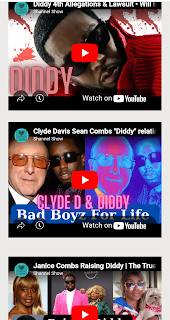This trial, already being called one of the most significant celebrity legal battles of the decade, has gripped the nation’s attention and raised serious questions about power, abuse, and the hidden lives of the rich and famous. Here's a breakdown of what’s unfolded and where things stand as of today.
Related Articles:
- The Connection between Ashton Kutcher and Sean Combs
- Kevin Hart and Diddy's Connection at the Party
- Justin Bieber after hanging at Diddy's House
- Diddy behind those Prison Walls
- Watch Diddy's Tarot Readings
The Government’s Case: A “Criminal Enterprise” Fueled by Control and Coercion
Federal prosecutors allege that Sean Combs was the mastermind behind a sprawling and secretive criminal enterprise. At the core of the government’s argument is the claim that Combs used his fame and fortune to facilitate a pattern of exploitation under the guise of lavish parties and romantic relationships.
According to the prosecution, these weren’t ordinary parties—they were “freak-offs,” gatherings where women, many of them Diddy's former girlfriends or romantic partners, were allegedly trafficked for sex through a mix of manipulation, drugs, and intimidation.
Prosecutors have painted a dark portrait of Combs as someone who operated behind closed doors with impunity. They allege that he:
-
Used physical violence and psychological intimidation to control women
-
Introduced drugs as a means to maintain submission
-
Financially coerced victims, including withholding rent or threatening exposure through sex tapes
-
Leveraged his vast influence in the music and entertainment industries to silence potential whistleblowers
The prosecution’s tone during closing arguments was severe. They described Combs as someone who “believed he was above the law,” using his wealth and celebrity status to mask years of abuse.
The Defense Strategy: Consensual Lifestyles, Not Criminal Activity
In a surprising and calculated move, Diddy’s defense team chose to rest their case without calling a single witness. Instead of mounting a traditional defense with testimony and cross-examination, they relied on dismantling the prosecution’s claims and reframing the narrative.
The defense argues that while Combs acknowledges a history of domestic violence—an admission that adds complexity to his public image—he vehemently denies any criminal wrongdoing related to trafficking.
Their main arguments include:
-
All sexual encounters were consensual and involved adult participants in the context of an alternative lifestyle
-
The so-called “freak-off” parties were not criminal in nature but part of a swinger scene where boundaries were mutually agreed upon
-
The government’s case is built largely on former partners and disgruntled associates, which they argue are not reliable sources
The defense has emphasized that there is no forensic evidence of trafficking or forced sex, and they contend that the prosecution’s narrative is built on an emotional appeal rather than hard facts.
Legal Compromises: RICO Charges Narrowed
The case is being prosecuted under the Racketeer Influenced and Corrupt Organizations Act (RICO), a statute traditionally used to bring down mafia bosses and organized crime syndicates. In Combs’s case, prosecutors sought to prove that he was the leader of an enterprise engaged in sex trafficking, drug distribution, and various acts of violence.
However, in the interest of jury clarity, both sides agreed to narrow the scope of the charges. Notably, the charges of attempted kidnapping and arson—which were originally part of the case—have been dropped.
Legal analysts suggest this move is strategic. By focusing the jury’s attention on the core charges of sex trafficking and coercion, both the prosecution and the defense are trying to simplify what has become a complex and emotionally charged case.
Public Reaction: A Nation Watching in Disbelief
The Combs trial has ignited national debate, not only for its lurid allegations but also for what it represents: the fall of a seemingly untouchable icon.
Diddy, once praised for his business savvy and trailblazing success in music, fashion, and liquor branding, now faces the possibility of spending decades behind bars. If convicted on all counts, he could face a mandatory minimum of 15 years in federal prison.
Social media has exploded with commentary. Some users rally behind Combs, citing the lack of physical evidence and the consensual nature of the encounters. Others are convinced that this is a long-overdue reckoning for a man who operated with unchecked power for far too long.
The case has also sparked broader discussions about celebrity culture, victim empowerment, and the role of the justice system in holding influential figures accountable.
What’s Next: Jury Deliberation Looms
As closing arguments continue, the jury is expected to begin deliberations in the coming days. The stakes couldn’t be higher—for Combs, for his accusers, and for an industry still grappling with the shadows of #MeToo.
While the defense has portrayed the trial as an exaggerated attack on a powerful Black man with an unconventional lifestyle, the prosecution insists it is a long-overdue pursuit of justice for victims who were silenced for years.
Ultimately, it will be up to 12 jurors to decide whether Diddy’s behavior crossed the line from morally questionable to criminally liable.
Regardless of the outcome, the trial of Sean “Diddy” Combs marks a turning point in American pop culture and the legal landscape surrounding celebrity accountability. It reminds the public that fame is not a shield from justice—and that beneath the glitz and glamour, there can lie stories of darkness yet to be fully told.
Stay tuned for updates as the jury begins deliberation and the world waits to see how this chapter ends.
